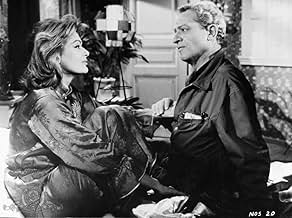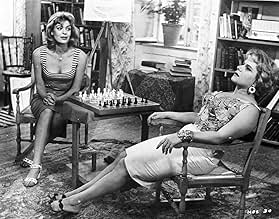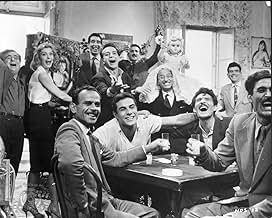IMDb रेटिंग
7.3/10
6.4 हज़ार
आपकी रेटिंग
अपनी भाषा में प्लॉट जोड़ेंAn American scholar in Greece sets about improving the prostitute with whom he is infatuated.An American scholar in Greece sets about improving the prostitute with whom he is infatuated.An American scholar in Greece sets about improving the prostitute with whom he is infatuated.
- 1 ऑस्कर जीते
- 3 जीत और कुल 8 नामांकन
Giorgos Foundas
- Tonio
- (as Georges Foundas)
Dimitris Papamichael
- British Seaman
- (as Dimitri Papamichael)
Thanasis Vengos
- Thanasis
- (as Thanassis Veggos)
फ़ीचर्ड समीक्षाएं
Melina Mercouri, "The Last Greek Goddess", stars in the comedy "Never on Sunday"(1960) directed/written by Jules Dassin. She plays Illia, the most sensuous and radiant "lady of the night" in the seaport Pyres where every man adores her and she is the one who chooses her partners. Mercouri was 40 years old when she played Illia but she did not hide a single day of her age and she was gorgeous, full of the inner fire and absolutely irresistible. When the new Pygmalion, the intellectual American named Homer (of course) sails into the town and meets Illia, he decides that his search for meaning of life would end in Pyres if he would reform Illia and make her change her way of life. With all his intellect and education he couldn't understand a very simple truth about Illia - only true love might change her. Homer played by director/writer Jules Dassin is the weakest part of this mostly charming comedy. I agree with one of the IMDb commenters who said that "Jules Dassin has directed a great movie but he should have hired an actor to play Homer, and not played it himself... A better actor might have found a way around the rough spots but Dassin magnifies them." I guess that in real life Dassin was much more charming that in the film because he and Mercouri were married in 1966 and stayed married until her death in 1994.
7.5/10
7.5/10
"Never on Sunday", that charming Jules Dassin film, was shown unexpectedly on cable recently. The inspired story of a happy prostitute working the waterfront of Piraeus, was a smash hit everywhere when it first came out. Mr. Dassin's love poem to Greece, a land he loved, added another layer to his distinguished career. Not being known for light comedies, this movie strikes the right tone from the start. The director himself decided to play the pivotal role of Homer Thrace, a Brooklyn scholar familiar with Greek culture, but naive in matters of the heart and sex.
Ilya, a happy-go-lucky prostitute, is loved by the men working in the port. She has no hangups, something, that in contrast, Homer is full of. After all, he came from a society where sex was for the most part a taboo for the society he came from during the time period where the action takes place. After all, America was not a sexually liberated country. Ilya, on the other hand, was free to share her services openly, as she saw fit without any problem. In a way, the relationship that develops between Homer and Ilya, is a modified version of Pygmalion and Galatea, something that Homer was happy to undertake, even though he knew better not to try.
Melina Mercouri dominates the film. She obviously enjoyed getting inside her character as it clearly shows on the screen. She gave a bigger than life reading in what was her best role in the movies. Ms. Mercouri's effortless performance wins the viewer right away because one realizes she is, like Fellini's Cabiria, a genuine soul that gives love without expecting anything in return.
Jules Dassin has been criticized by some contributors to IMDb by his take on Homer, but actually, he also gives an appealing account of his scholar. Not being an actor, he understood what he wanted to accomplish with this Brooklyn man that has spent most of his life around books, but not around real life, something he finds living among the earthy people around the Greek port where he spends his vacation. In fact, he kept reminding this viewer of this type of individual that is more at home among books than with real people.
The black and white cinematography of Jacques Natteau, enhances the film and the background in which it was filmed. Manos Hatzidakis' delightful music score plays well in the story and it's never out of touch with what the director conceived. Ultimately, the film was another triumph for Jules Dassin, an American original whose body of work speak for itself.
Ilya, a happy-go-lucky prostitute, is loved by the men working in the port. She has no hangups, something, that in contrast, Homer is full of. After all, he came from a society where sex was for the most part a taboo for the society he came from during the time period where the action takes place. After all, America was not a sexually liberated country. Ilya, on the other hand, was free to share her services openly, as she saw fit without any problem. In a way, the relationship that develops between Homer and Ilya, is a modified version of Pygmalion and Galatea, something that Homer was happy to undertake, even though he knew better not to try.
Melina Mercouri dominates the film. She obviously enjoyed getting inside her character as it clearly shows on the screen. She gave a bigger than life reading in what was her best role in the movies. Ms. Mercouri's effortless performance wins the viewer right away because one realizes she is, like Fellini's Cabiria, a genuine soul that gives love without expecting anything in return.
Jules Dassin has been criticized by some contributors to IMDb by his take on Homer, but actually, he also gives an appealing account of his scholar. Not being an actor, he understood what he wanted to accomplish with this Brooklyn man that has spent most of his life around books, but not around real life, something he finds living among the earthy people around the Greek port where he spends his vacation. In fact, he kept reminding this viewer of this type of individual that is more at home among books than with real people.
The black and white cinematography of Jacques Natteau, enhances the film and the background in which it was filmed. Manos Hatzidakis' delightful music score plays well in the story and it's never out of touch with what the director conceived. Ultimately, the film was another triumph for Jules Dassin, an American original whose body of work speak for itself.
To a committed hellenophile, this film represents all things that are great about Greece - the food, the music, the people.
First, there is the incomparable music of Manos Hatzidakis, who won an Oscar for the title song.
Then, there is Melina Mercouri, the star of the film, who won at Cannes for her role, as well as getting an Oscar and BAFTA nomination. The Minister of Culture after the fall of the dictatorship in Greece, she was magnificent.
She later married the writer/director of the film, Jules Dassin, who received two Oscar nominations for this film, as well as a BAFTA nomination. Dassin is also well know for the film Rififi.
Watching film is a trip back to the old Greece when the spirit was high and people lived life to the fullest. It is a trip worth taking many times.
First, there is the incomparable music of Manos Hatzidakis, who won an Oscar for the title song.
Then, there is Melina Mercouri, the star of the film, who won at Cannes for her role, as well as getting an Oscar and BAFTA nomination. The Minister of Culture after the fall of the dictatorship in Greece, she was magnificent.
She later married the writer/director of the film, Jules Dassin, who received two Oscar nominations for this film, as well as a BAFTA nomination. Dassin is also well know for the film Rififi.
Watching film is a trip back to the old Greece when the spirit was high and people lived life to the fullest. It is a trip worth taking many times.
SYNOPSIS: A well educated American tourists attempts to 'enlighten' a Greek prostitute in a small seaside village.
CONCEPT IN RELATION TO THE VIEWER Newer is not always better, and sometimes over analyzing a problem can only make it worse. Leave well enough alone. It is more important to be happy than to understand everything.
PROS AND CONS Every recent prostitute film from 'Irma la Duce' to 'Pretty Woman' owes a lot to this work. It was one of the first films that shed light on the idea that prostitution was a respectable and acceptable way to make a living.
If nothing else this film is a homage by Jules Dassin to his wife, Melina Mercouri. She is the focus of the film and she captivates any scene she is in with her zest for life and smoldering sexuality. The other thing you tend to fall in love with is the romantic ideal of living in Greece in 1960. It appears care free, relaxed and almost infectious with its love of the simple life.
The plot of the film is not overly complex and deals with an outsider, Homer (Dassin) arriving in town to study Greek culture. He is almost immediately captivated by Ilya (Mercouri) as one of the local prostitutes that 'freelances' and does not work for the town pimp. She negotiates a price with whomever she chooses, and sleeps with all the towns vendors in exchange for her daily goods (food, wine, drinks, etc), but she never 'works' on Sunday. Hence the title to the film.
Homer is smitten by Ilya and decides that he must 'save' her from what he perceives as a wretched life that is going no where and decides to educate her so that she can see the error of her ways. In the end, this does nothing but frustrate everyone in town. The education of Ilya does have a silver lining, which if anything, leaves the town more corrupted than when Homer found it.
The underlying theme of the film is that one should strive to be happy in what you do and more importantly, who you know. There is an interconnection between people in a small town, and disrupting those connections may lift some people up, but is not good for the whole of society. Regardless of his meddling, the towns people never turn on Homer, or blame him for anything. At their core, they know that life is to be enjoyed and blaming people for your troubles is just not part of the mix.
CONCEPT IN RELATION TO THE VIEWER Newer is not always better, and sometimes over analyzing a problem can only make it worse. Leave well enough alone. It is more important to be happy than to understand everything.
PROS AND CONS Every recent prostitute film from 'Irma la Duce' to 'Pretty Woman' owes a lot to this work. It was one of the first films that shed light on the idea that prostitution was a respectable and acceptable way to make a living.
If nothing else this film is a homage by Jules Dassin to his wife, Melina Mercouri. She is the focus of the film and she captivates any scene she is in with her zest for life and smoldering sexuality. The other thing you tend to fall in love with is the romantic ideal of living in Greece in 1960. It appears care free, relaxed and almost infectious with its love of the simple life.
The plot of the film is not overly complex and deals with an outsider, Homer (Dassin) arriving in town to study Greek culture. He is almost immediately captivated by Ilya (Mercouri) as one of the local prostitutes that 'freelances' and does not work for the town pimp. She negotiates a price with whomever she chooses, and sleeps with all the towns vendors in exchange for her daily goods (food, wine, drinks, etc), but she never 'works' on Sunday. Hence the title to the film.
Homer is smitten by Ilya and decides that he must 'save' her from what he perceives as a wretched life that is going no where and decides to educate her so that she can see the error of her ways. In the end, this does nothing but frustrate everyone in town. The education of Ilya does have a silver lining, which if anything, leaves the town more corrupted than when Homer found it.
The underlying theme of the film is that one should strive to be happy in what you do and more importantly, who you know. There is an interconnection between people in a small town, and disrupting those connections may lift some people up, but is not good for the whole of society. Regardless of his meddling, the towns people never turn on Homer, or blame him for anything. At their core, they know that life is to be enjoyed and blaming people for your troubles is just not part of the mix.
Melina Mercouri takes an often-played role - the 'Whore with a Heart of Gold who Loves Life Despite It All' - and makes it her career-defining movie role, and she is the entire reason to watch the movie. Fiercely independent, sexually progressive, not spending her life trying to find the perfect man and gorgeous, she's a force of life.
Jules Dassin has directed a great movie but he should have hired an actor to play Homer, and not played it himself. He almost ruins all the charm the movie has going for it with his ineffective acting, bad line readings and stupid motivations. A better actor might have found a way around the rough spots but Dassin magnifies them.
Mercouri probably should have won Best Actress that year, but who can beat a Liz Taylor death scare? Plus Simeone Signoret had won Best Actress the year before, and Sophia Loren would win the following year..you don't want to upset icons like Louella Parsons, Frank Sinatra and John Wayne by giving ALL the Oscars to foreigners, do you?? Maybe the fact that she does not die at the end was too much..we all know the odds of longevity for a hooker in a Hollywood movie. Taylor met that criteria, as if she needed to help her own odds after almost dying of pneumonia.
Worth watching for sure. 8/10.
Jules Dassin has directed a great movie but he should have hired an actor to play Homer, and not played it himself. He almost ruins all the charm the movie has going for it with his ineffective acting, bad line readings and stupid motivations. A better actor might have found a way around the rough spots but Dassin magnifies them.
Mercouri probably should have won Best Actress that year, but who can beat a Liz Taylor death scare? Plus Simeone Signoret had won Best Actress the year before, and Sophia Loren would win the following year..you don't want to upset icons like Louella Parsons, Frank Sinatra and John Wayne by giving ALL the Oscars to foreigners, do you?? Maybe the fact that she does not die at the end was too much..we all know the odds of longevity for a hooker in a Hollywood movie. Taylor met that criteria, as if she needed to help her own odds after almost dying of pneumonia.
Worth watching for sure. 8/10.
क्या आपको पता है
- ट्रिवियाFeatures first song ("Never On Sunday") from a foreign-made movie to win an Oscar.
- गूफ़At their first meeting, when Ilya looks at Homer through the viewfinder of his camera, he is looking straight-on at the camera. But when she looks up from the camera, Homer is sitting slightly to her left and has to turn to his right -- and thus is not looking straight-on -- when he speaks to her.
- कनेक्शनFeatured in Toute la chanson: 30 मई 1960 को प्रसारित एपिसोड (1960)
टॉप पसंद
रेटिंग देने के लिए साइन-इन करें और वैयक्तिकृत सुझावों के लिए वॉचलिस्ट करें
- How long is Never on Sunday?Alexa द्वारा संचालित
विवरण
- रिलीज़ की तारीख़
- कंट्री ऑफ़ ओरिजिन
- आधिकारिक साइट
- भाषाएं
- इस रूप में भी जाना जाता है
- Never on Sunday
- फ़िल्माने की जगहें
- उत्पादन कंपनी
- IMDbPro पर और कंपनी क्रेडिट देखें
बॉक्स ऑफ़िस
- बजट
- $1,51,000(अनुमानित)
- चलने की अवधि1 घंटा 31 मिनट
- रंग
- ध्वनि मिश्रण
- पक्ष अनुपात
- 1.66 : 1
इस पेज में योगदान दें
किसी बदलाव का सुझाव दें या अनुपलब्ध कॉन्टेंट जोड़ें






































